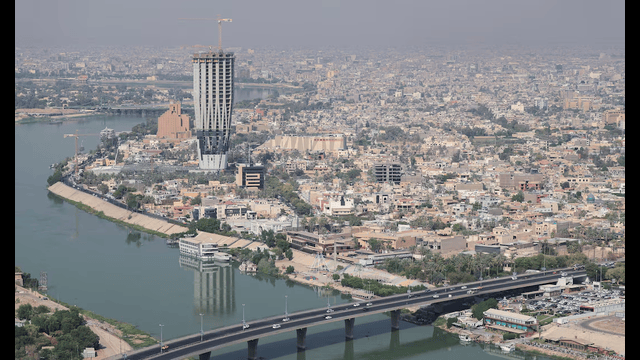
A view of Baghdad from above, taken on August 11, 2021. REUTERS
U.S. President Donald Trump announced on Wednesday that some U.S. personnel are being moved out of the Middle East. He said, “It could be a dangerous place,” and added that the U.S. would not let Iran develop a nuclear weapon.
Partial Evacuation Begins
Reports revealed that the U.S. is preparing to evacuate some staff from its embassy in Iraq. Military families in areas like Bahrain and Kuwait are also allowed to leave. A senior official confirmed this step was taken because of growing safety risks.
The State Department released an updated travel advisory. It said the U.S. ordered the departure of non-emergency government staff on June 11 due to rising tensions in the region.
Rising Concerns Over Iran
Trump told reporters, “They are being moved out because it could be a dangerous place.” When asked if the situation could calm down, he said, “They can’t have a nuclear weapon. Very simple.”
Negotiations between the U.S. and Iran over its nuclear program appear stuck. Trump has warned of action if Iran does not stop enriching uranium.
Iran’s Defense Minister Aziz Nasirzadeh responded strongly. He said if Iran is attacked, it will strike back at U.S. bases in the region.
Military Presence Still Strong
Despite the evacuation of some families, U.S. embassies in Kuwait and Qatar are operating normally. One U.S. official confirmed there was no change at Al Udeid Air Base in Qatar—the biggest American base in the Middle East.
The U.S. still has troops stationed across Iraq, Kuwait, Bahrain, Qatar, and the UAE. A U.S. official said military help is ready if needed during any evacuation. Another said the State Department aims to use commercial flights to move embassy staff from Baghdad.
Iraq’s government, however, stated it has not seen any reason to evacuate. There have been no specific threats so far, according to a government source.
Oil Prices Jump
News of the Baghdad evacuation pushed oil prices up by over 4%. Brent crude rose to $69.18 per barrel. Tensions have sparked concern over the safety of key shipping routes in the region.
Britain’s maritime agency warned that military activity could increase around the Gulf, Oman, and Hormuz. Ships were advised to proceed with caution.
Iran and the U.S.: Ongoing Struggle
Since the war in Gaza began in October 2023, Iran-backed groups in Iraq have targeted U.S. troops several times. The situation has calmed down slightly, but threats still remain.
Israel and Iran exchanged fire last year, with missiles flying over Iraq. Israel has also hit Iran-backed targets in Iraq and Syria.
To stay prepared, the U.S. sent extra military equipment to the region in recent months. That included B-2 bombers and an aircraft carrier, both of which have since left.
Next Steps
New nuclear talks are expected soon. Iran plans to reply to a recent offer from the U.S. A senior Iranian source said the U.S. always uses military threats as part of its strategy.
Iran's U.N. mission posted online: “Iran is not seeking a nuclear weapon. U.S. militarism only fuels instability.”
In response to the situation, U.S. General Michael Kurilla delayed his testimony in front of lawmakers. He said he had already provided options to stop Iran from gaining nuclear weapons.















